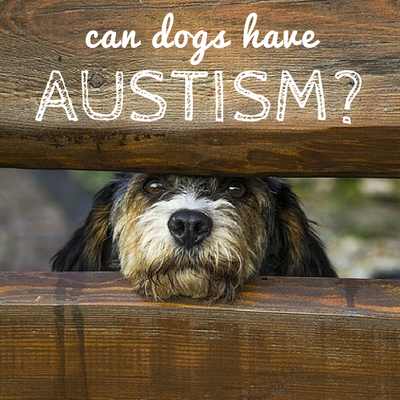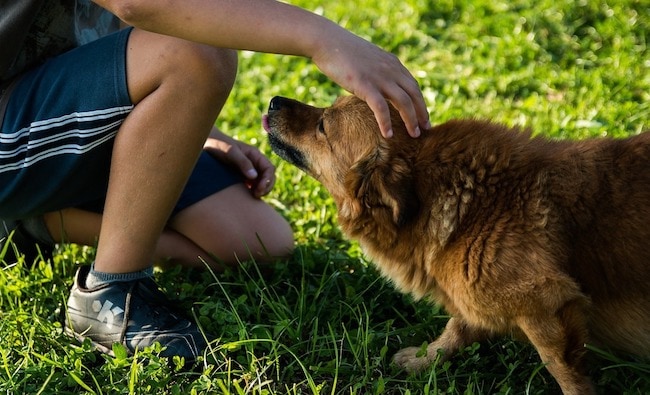 Autism is a subject that elicits strong emotions in many people, particularly those who have seen a loved one struggle with the tragic condition.
Autism is a subject that elicits strong emotions in many people, particularly those who have seen a loved one struggle with the tragic condition.
Making matters worse, the medical community does not yet fully understand autism spectrum disorders, and for the most part, questions outnumber answers.
This applies doubly to the subject of canine autism. Canine autism spectrum disorders haven’t been the subject of very much rigorous study, and opinions vary widely from one veterinarian and researcher to the next.
Some believe that the autism condition can, in fact, afflict dogs, while others are reluctant to label problematic behaviors as being caused by autism; instead, they consider these symptoms part of a dysfunctional behavioral pattern.
What Are Autism Spectrum Disorders?
Before delving deeper into the issue of canine autism spectrum disorders, let’s review the basic facts about the condition.
Scientists don’t fully understand autism spectrum disorders – even when they occur in humans. And although most children that suffer from the disorder do exhibit some biochemical differences when compared with their peers, there is no “laboratory test” for autism. A subjective diagnosis is made based on the examination of behavioral characteristics.
According to the National Institute of Mental Health (a division of the National Institutes of Health), people with an autism spectrum disorder often exhibit a combination of social problems related to the ability to communicate and interact with others, and repetitive behaviors.

Some scientists suspect that the root of autism spectrum disorders occurs in specialized brain cells called mirroring neurons, and there is some data that backs this assertion. These neurons are involved in the recognition of emotions in other people, empathy and mimicking behaviors. Accordingly, dysfunction in these neural circuits would explain some of the symptoms associated with autism spectrum disorders.
As it turns out, dogs have mirror neurons too. As in humans, these mirror neurons play an important role in the bonding process and other social behaviors. It is therefore possible that dogs suffering from autism-like conditions have problems with their mirror neurons, but this has yet to be established conclusively.
Symptoms Displayed by Presumably Autistic Dogs
Regardless whether scientists ultimately discover that dogs can get autism or they demonstrate that dogs cannot suffer from the ailment; many dogs exhibit symptoms that are similar to those of autism in humans.
Some of the most common symptoms include:
- Lethargy or disinterest in activities that would be fun for most dogs
- Repetitive behaviors
- Walking in slow motion
- Failure to make or hold eye contact
- Over-reactions to loud noises or surprising occurrences
- Displaying a trance-like state
- Focusing on floors, walls or other inanimate objects for prolonged periods of time
- Displaying anxiety when faced with new things or activities
- Difficulty or failure in exhibiting emotions
- Failure to interact with their owner or other dogs
Here’s a brief video showing the bizarre pre-feeding behavior of a dog suspected of having autism:
A Cluster of Corroborating Clues: Fragile X Syndrome, Tail Chasing, and Bull Terriers
Although scientists do not fully understand what causes autism, several risk factors have been identified, such as being male, having an autistic sibling, or being born to an older mother.
Another important risk factor is the presence of any of several other medical conditions, including:
- Tourette syndrome
- Tuberous sclerosis
- Fragile X syndrome
Fragile X syndrome is an inherited genetic disorder that is located on the X chromosome. Some research indicates that as many as 60% of those diagnosed with fragile X syndrome also exhibit ASD.
Among other symptoms, fragile X syndrome causes the development of a prominent forehead, an elongated face, large ears and a high-arched palate.
Bull Terriers and Tail Chasing: OCD Or Something Else?
 Scientists have considered the possibility that autism spectrum disorders can afflict dogs since 1966.
Scientists have considered the possibility that autism spectrum disorders can afflict dogs since 1966.
However, the subject didn’t receive a whole lot of attention until a few researchers began investigating the tail-chasing behavior commonly seen in some bull terrier lines.
At first, the scientists suspected that the tail-chasing behavior was the result of an obsessive-compulsive disorder (OCD).
However, after comparing the genetic code of the bull terriers with other breeds that exhibit OCD-like problems, they found that the bull terriers lacked the mutation responsible for triggering OCD in these other breeds.
Once they knew OCD wasn’t the cause of the tail-chasing behavior, the scientists began considering other possibilities.
Some noticed that these tail-chasing terriers also exhibited other behavioral quirks. For example, many were from seizure-prone lineages, some displayed explosive aggression, and some were prone to entering a trance-like state. Also, most of the afflicted dogs were male.
Fragile X Syndrome in Dogs: Bull Terriers Look The Part
These traits are consistent with autism in many ways, but it wasn’t until scientists noticed another similarity between these bull terriers and some autistic children that they really started to suspect these terriers were suffering from a form of autism: Bull terriers look like they have fragile X syndrome.

As with humans who suffer from fragile X syndrome, bull terriers have a prominent forehead, elongated face, protruding ears and a high-arched palate.
Encouraged by this new insight, the researchers began testing the blood of these terriers to look for biomarkers of autism. In doing so, the scientists found that many of these bull terriers had elevated levels of neurotensin and corticotrophin releasing hormone, just like autistic humans often do.
So, while consensus has yet to be reached, there is a growing body of evidence that does suggest autism-like disorders can occur in dogs.
How to Treat a Potentially Autistic Dog
Regardless of whether canine autism is an actual ailment or if the condition is caused by some other illness or dysfunction, the important thing is that you give your dog the highest quality of life possible.
You’ll need veterinary assistance for some treatments, but there are also a variety of steps you can take on your own.
Some of the best ways to treat a potentially autistic dog include:
- Medications: There are a variety of medications used to treat autism in humans, and your veterinarian may be able to prescribe one or more medications to alleviate or curtail some of your dog’s most troubling symptoms. For example, Fluoxetine (Prozac) is used to treat problems associated with autism and OCD in humans, and is also used to treat similar conditions in dogs.
- Avoid Stressful Situations: Many dogs that exhibit autism-like behaviors are fearful of people, particularly strangers. In such cases, it is wise to simply avoid situations that force your pup to interact with strangers, such as going to the park or the pet store. Just make sure your dog still gets ample exercise. You may even consider obtaining a dog-friendly treadmill.
- Veterinary Home Visits. You may also consider looking for a vet that makes house calls (they do exist, although they aren’t common), so you can still obtain quality veterinary care, without needing to take your dog into the vet’s crowded, noisy office.
- Anti-Anxiety Wraps. Compression wraps and snug-fitting clothing like a ThunderShirt (or a similar DIY alternative) may also help your dog feel safe and protected, as they do for dogs with a variety of behavioral and emotional problems.
- Secure Kennel Space. Be sure to provide dogs that display autism-like symptoms with a quiet, secure kennel or similar hiding spot into which he can retreat when he is frightened. Having a crate provides your pup with a safe space to call his own, and go a long way in helping your dog cope.
- Crate Covers. A crate cover can also do wonders to make your pup feel more secure.
- Plenty of Exercise. All dogs need exercise, but it can be especially helpful for alleviating the stress and anxiety of some autistic dogs. You can increase the workout value of a regular walk by fitting your pup with a weighted vest or a saddlebag filled with water bottles.
- Physical Therapy. Some dogs respond very well to physical therapy, especially when it involves a calm, reassuring touch and massage-like techniques.
In all cases, remember that there is no one-size-fits-all treatment for dogs that may be suffering from autism-like conditions. You’ll want to tailor the treatment to your dog’s specific challenges and help shield him from things that may trigger undesirable behaviors.
***
If you think your dog may be suffering from autism, contact your veterinarian or a behavioral specialist and have him evaluated. Although you may not get a definitive answer, you’ll surely benefit from your vet’s opinion on the matter and any treatments he or she suggests.
With proper care and treatment, your dog will still enjoy a high quality of life!
No comments:
Post a Comment